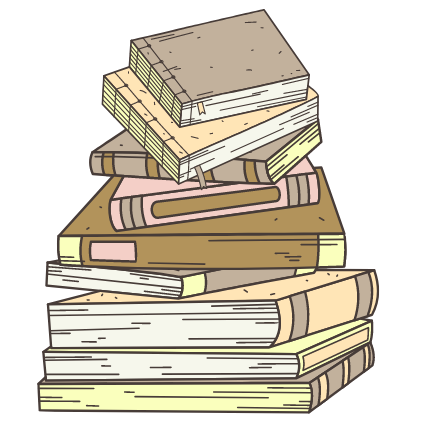
How to Keep From Injuring Your Books
Greetings, dear readers. It is I, your book.
I spend my days sitting on your shelf with my fellow books, waiting for the chance to be read. I must confess, though, that some of us are a bit afraid for that moment. You see, we come out of a bookstore perfectly pristine. Our pages are clean and uncreased. Our covers sparkle and shine without any dents or nicks. Our spines are whole and beautiful.
We have seen what happens to those books who are handled roughly. Even though oftentimes this might be an accident, it still hurts us. Pages ripped. Covers splotched. Spines cracked. The horror!
So today, on behalf of myself and the many other books on your bookshelf, I present to you a list of habits and practices to keep us healthy rather than injured.

Tip #1: Utilize Book Sleeves
We know you like to take a book with you wherever you go. As nice as it is to read a book while sitting on an airplane or riding in the car, I personally do not enjoy being shoved in the bottom of a backpack. The thought of darkness and various candy wrappers or leaking water bottles makes me tremble. It’s not good for my complexion.
However, I acknowledge that part of our duty as books is to entertain you during such boring times as travel. I will endure the tragedies of backpacks and airport security, but I implore you to give us a piece of armor or protection before you put us in that no-man’s land of a backpack.
May I present: book sleeves.
These cushioned sleeves help keep our corners from being bent. The thick layers of fabric provide some insurance against spilled drinks and leaking water bottles. Not to mention that the many patterns and sizes of book sleeves available can be quite pretty . . . the perfect thing to complement my undamaged cover.
Tip #2: Avoid Spine Cracking
You might get your spine cracked at a chiropractor’s office to feel better. Well, you are a human. I am a book and I, for one, must disagree.
You don’t know the aches and pains that come from a cracked spine, no matter how satisfying it is to crack it. And I must add that it really takes away from my beauty when sitting on a shelf next to the other books.
Thankfully, a new, preventative treatment for books has emerged on the internet. Simply stand me up with my spine on a flat surface. Then fold down my pages, one by one. Afterwards, the chances of a cracked spine will greatly decrease and all the books in the land will thank you for no back pain.
Tip #3: Remove Dust Jackets
Our friends the Hardcovers are quite privileged in many ways. A solid cover prevents their pages from being creased, and generally their covers can stay nice for much longer. Hardcover books also have a heft to them that has been loved by readers for millenia, which can make for quite effective self defense weapons.
But, do not think that the Hardcovers are completely dismissed from the tragedies a book can encounter in its life. No, there is one thing that could ruin a Hardcover’s beauty: the dust jacket. This little thing is as flimsy and crinkle-worthy as our own paperback covers. If not more.
While the solid cover may remain intact and undamaged for a long time, the dust jacket quickly can acquire wrinkles, creases, or even a tear or two. The poor hardcover doesn’t deserve to put such a sad and hurt dust jacket on.
So, on behalf of the hardcover books out there, think about removing the dust jackets before you read your book. Put the weak paper cover in a drawer where it will be safe and sound until it’s read through. Then return your hardcover book to its corresponding dust jacket, and place it back on the bookshelf and admire the perfection.
Tip #4: If You Must Dog-Ear, Do It Small
As books, we love to be read. It is our purpose in life. However, there is a certain type of reader that we dread: the dog ear-er.
While some readers use colorful bookmarks to mark their spot, and others use random nicknacks such as candy wrappers or pencils, the dog ear-er enacts much more harm on the poor, undeserving book. They take the corner of a page and crease it. If you thought a cracked spine was painful to a book, you have not experienced the pain of a dog ear.
While dog-earing is a painful and gruesome thing to do, sometimes it is an absolute necessity. In the absence of a bookmark, you may find yourself resorting to this option. But, If you must do this, please make your dog ear as small and miniscule as possible. It may be a little bit harder to find your page, but the dog ear will look more like a mere accident rather than a purposeful torture method.
Tip #5: Rescue the Used Books
This tip does not directly relate to keeping us books from being damaged, but it is another issue books face. Some books are like outcasts, sitting on a shelf no matter where they go. The books at thrift stores, garage sales, a friend’s basement, used bookstores, or even online stores such as Ebay are a lonesome bunch.
Here they sit, awaiting to be read, while the newer, shinier books get picked up off of their shelf and brought home. These poor used books may have been a little bruised here and there, but they would benefit greatly from your kind and loving shelf. Not to mention that these used books are usually sold for a lesser price than brand-new books. Perhaps you might think about rescuing one of them.

Once again, I speak on behalf of all of the books out there – the hardcovers, the paperbacks, the used books, the picture books, – and even the encyclopedias. We hope you find these tips for our care useful and that you will apply them to your own books at home.
Sincerely,
The Books
Hi! I’m Hannah, a crazy pen-wielding, jack-of-all-trades writer. I write contemporary stories with a magical (or vintage!) twist, usually featuring big families, delicious food, and a few tear jerking scenes. When I’m not writing, you could find me camping, sewing, hiking, cycling, skiing, playing violin or piano, reading, and many other “-ing” words.
